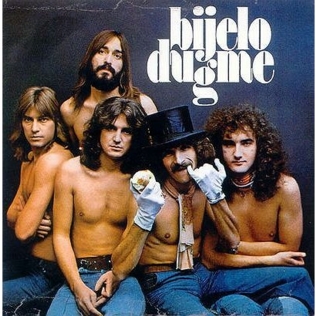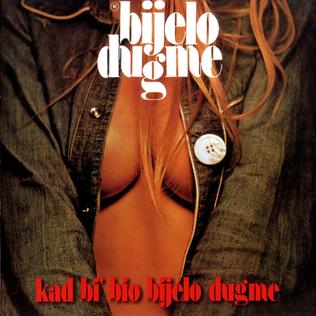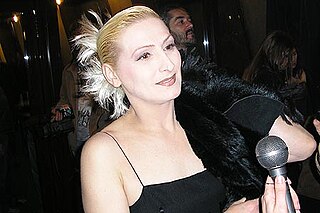Related Research Articles

Prljavo kazalište is a rock band from Zagreb, Croatia. Since its formation in 1977, the group changed several music styles and line ups but remained one of the top acts of both the Croatian and Yugoslav rock scenes.

Borisav "Bora" Đorđević, also known as Bora Čorba, is a Serbian singer, songwriter, and poet. He is best known as the frontman of the rock band Riblja Čorba. Renowned for his brand of poetic lyrics and husky baritone voice, Đorđević is widely considered one of the top and most influential authors of the Serbian and Yugoslav rock scene.

Bajaga i Instruktori are a Serbian and Yugoslav rock band formed in Belgrade in 1984. Founded and led by vocalist, guitarist and principal composer and lyricist Momčilo Bajagić "Bajaga", the group is one of the most notable acts of the Yugoslav rock scene.
Jutro was a Sarajevo-based rock band most notable as the immediate predecessor to Bijelo Dugme. It existed from late 1971 until the very end of 1973 when it transformed into one of the most successful rock bands ever to come out of SFR Yugoslavia — Bijelo Dugme.

Bijelo Dugme was a Yugoslav rock band, formed in Sarajevo, SR Bosnia and Herzegovina in 1974. Bijelo Dugme is widely considered to have been the most popular band ever to exist in the former Socialist Federal Republic of Yugoslavia and one of the most important acts of the Yugoslav rock scene.

Kad bi' bio bijelo dugme is the 1974 debut studio album from influential Yugoslav rock band Bijelo Dugme.

Eto! Baš hoću! is the third studio album by Yugoslav rock band Bijelo Dugme, released in 1976.

Bitanga i princeza is the fourth studio album by Yugoslav rock band Bijelo Dugme, released in 1979.

Doživjeti stotu is the fifth studio album by Yugoslav rock band Bijelo Dugme, released in 1980.

Smak was a Serbian and Yugoslav band from Kragujevac. The group reached the peak of popularity in the 1970s when it was one of the most notable acts of the former Yugoslav rock scene. The band's leader, guitarist Radomir Mihailović, nicknamed Točak, is considered one of the most influential guitarists on the former Yugoslav rock scene.

Ćiribiribela is the ninth and final studio album released by Yugoslav rock band Bijelo Dugme, released in 1988. Ćirbiribela would be the band's last release before the band's 2005 reunion and the live album Turneja 2005: Sarajevo, Zagreb, Beograd.

Bijelo Dugme is the seventh studio album by former Yugoslav and Bosnian rock band Bijelo Dugme. Due to Bijelo Dugme's usage of Uroš Predić's famous painting Kosovo Maiden for the album cover, the album is unofficially known as Kosovka djevojka.

Goran Bregović is a self-titled album by Bijelo dugme's frontman Goran Bregović, released in 1976 in-between the band's second and third studio albums.
Zana is a Serbian and Yugoslav rock and pop group formed in Belgrade in 1979.

Lazar "Laza" Ristovski was a Serbian and former Yugoslav keyboardist, known for being a member of rock bands Smak and Bijelo Dugme, as well as for his eclectic solo work that spanned many different musical genres.

Snežana Mišković, better known by her stage name Viktorija, is a Serbian female rock singer known for her raspy voice.
Adnan Babajić is a Bosnian singer and television personality, who came to media attention as the winner of talents show Operacija trijumf, and thus signed a recording contract for an album for foreign market with Universal Music Group.
YU retROCKspektiva is a compilation album series released by Serbian record label Komuna in 1994. The discs, compiled by Serbian music critics Bogoljub Mijatović and Peca Popović, feature songs by artists from the former Yugoslav rock scene.
Rockovnik is a forty-episode documentary aired on Radio Television of Serbia in 2011, written by Sandra Rančić and Dušan Vesić and directed by Vesić. The series focuses on the history of former Yugoslav rock scene from its beginnings in the late 1950s until the year 2000. The name of the show is a bilingual pun based on the words "rock" and "rokovnik".
Vatreni Poljubac is a Bosnian and Yugoslav hard rock / heavy metal band, formed in 1977 by composer, lyricist, vocalist and guitarist Milić Vukašinović. The band is widely considered to be regional pioneers of the heavy metal genre and one of the most important rock bands of Sarajevo and former Yugoslavia pop-rock scene. In almost 40 years since its founding, the band has released 9 studio albums, the latest being 2011 reunion release Kad svira rock 'n' roll, two singles and several compilation albums.
References
- ↑ "Preminuo Zoran Stojanović Ciga", Balkanrock.com Archived 2012-11-09 at the Wayback Machine
- Enciklopedija niškog Rock 'n' Rolla 1962 - 2000, Stanojević Vladan; ISBN 86-902517-1-5